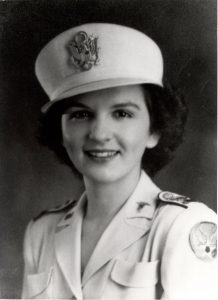Meet the former US Army flight nurses whom I interviewed for
Beyond the Call of Duty: Army Flight Nursing in World War II.
In 1986 as part of my research about flight nurse history and coping with war, I was privileged to interview 25 former US Army nurses about events of their flight nurse duty in World War II. Most of them are now deceased, but their stories live on in Beyond the Call of Duty: Army Flight Nursing in World War II.
The journal I kept of my time with each of them in 1986 when writing my dissertation offers a brief personal glimpse of these remarkable women. I am sharing edited versions of these journals, in the order in which the interviews took place. The actual interviews are in separate documents.
14th Interview
Sally Jones Sharp
812 MAES Pacific
21 May 1986
I drove from St Petersburg to Winter Park, Florida outside Orlando to interview Sally Sharp in her home. She and her husband Ray had a wager set on my arrival—Ray won when I arrived only nine minutes past my anticipated 1800 hours (6 o’clock p.m.) arrival without needing to call them for directions.
Sally was fixing dinner when I arrived, and we enjoyed a very pleasant meal. Both Sally and her husband are retired military, and I learned about their careers after World War II.
After dinner Sally and I began our interview. She didn’t believe she had much to contribute. She was not as easily interviewed as some women, because her attitude about the interview was not positive like that of other informants has been. When asked how she felt about being a flight nurse, for example, Sally replied, ‘Never thought anything about it! It was just a job to be done. And I did like flying at the time.” It’s why she went into the military, and what she wanted to do. Sally was very cooperative, however, and she answered all my questions. She simply didn’t share very much in response to any area of questioning. And I chose not to belabor the point at hand.
It’s just as well that I didn’t try too hard to get her to talk more. Sally stated that she is not a nostalgic person, and she consequently doesn’t often think about her experiences as a flight nurse in World War II. She was a pragmatist about her work. “I guess maybe I wasn’t such a deep thinker—it was just a job you did, and you did it. I mean, not all jobs that you have are seventh heaven or paradise, you know. There’s good and bad with everything,” Sally said. “So you’re inconvenienced for a day or two or an overnight, you know—that’s no big deal.” She didn’t expect anything else. “I mean, how could you have everything plush when there’s a war going on? That’s ridiculous!”
Later, after the interview, Sally told me that during our interview she had been wondering why I asked the questions I did, but she decided they must be relevant to the study. Sally’s overall attitude about her assignment as a flight nurse in World War II was that she was just doing her job. This attitude was apparent in her response to the interview.
One of Sally’s stories: Sally remembers that at the end of the war, she had hoped to fly into Japan to bring out the POWs, but instead the flight nurses in her squadron waited in Hawaii for their orders to return to the states. Sally thought it would have been a fitting conclusion to her flight nurse duty overseas.
Sally died in 2002.



